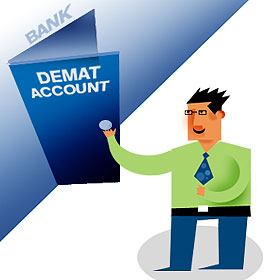
 ave you decided to buy shares this year?
ave you decided to buy shares this year?
Or at least decided that you want a part of the Initial Public Offering (IPO) pie, which promises to be big this year.
If yes, this is what you need to do.
First, open a demat account.
Let's tackle a few questions that come to mind.
What's the difference between a depository and a depository participant?
A depository is a place where the stocks of investors are held in electronic form.
The depository has agents who are called depository participants (DPs).
Think of it like a bank. The head office where all the technology rests and details of all accounts held is like the depository. And the DPs are the branches that cater to individuals.
There are only two depositories in India -- the National Securities Depository Ltd (NSDL) and the Central Depository Services Ltd (CDSL). There are over a 100 DPs.
What's a demat account?
Demat refers to a dematerialised account.
Just as you have to open an account with a bank if you want to save your money, make cheque payments etc, you need to open a demat account if you want to buy or sell stocks.
So it is just like a bank account where actual money is replaced by shares.
You have to approach the DPs (remember, they are like bank branches), to open your demat account.
Let's say your portfolio of shares looks like this: 40 of Infosys, 25 of Wipro, 45 of HLL and 100 of ACC.
All these will show in your demat account.
So you don't have to possess any physical certificates showing that you own these shares. They are all held electronically in your account.
As you buy and sell the shares, they are adjusted in your account.
Just like a bank passbook or statement, the DP will provide you with periodic statements of holdings and transactions.
Is a demat account a must?
Nowadays, practically all trades have to be settled in dematerialised form.
Although the market regulator, the Securities and Exchange Board of India (SEBI), has allowed trades of upto 500 shares to be settled in physical form, nobody wants physical shares any more.
So a demat account is a must for trading and investing.
Where do I begin?
- Look for a DP to have an account with
Most banks are also DP participants, as are many brokers.
You can choose your very own DP.
To get a list, visit the NSDL and CDSL websites and see who the registered DPs are.
A broker is separate from a DP. A broker is a member of the stock exchange, who buys and sells shares on his behalf and on behalf of his clients.
A DP will just give you an account to hold those shares.
You do not have to take the same DP that your broker takes. You can choose your own.
But many brokers offer special incentives in the form of lower charges for opening demat accounts with their DPs.
-
Get your documents in place
Once you approach your DP, you will be guided through the formalities of opening an account.
You must fill up an account opening form and sign an agreement with your DP.
The DP will ask for some documents as proof of your identity and address.
Check with them what they require. For instance, some may accept a driver's license, others may not.
Here is a broad list (you won't need all of them though):
PAN card
Voter's ID
Passport
Ration card
Driver's license
Photo credit card
Employee ID card
Bank attestation
IT returns
Electricity/ Landline phone bill
While they only ask for photocopies of the documents, they will need the originals for verification.
You will have to submit a passport size photograph on which you sign across.
- How many shares you need to have to open an account
When opening an account with a bank, you need a minimum balance.
Not so with a demat account. A demat account can be opened with no balance of shares.
And there is no minimum balance to be maintained either. You can have a zero balance in your account.
- What will it cost?
The charges for account opening, annual account maintenance fees and transaction charges vary between DPs. To get a comparative idea, visit the websites of NSDL and CDSL.
- Can I nominate?
Sure. You can nominate whoever you like by filling up the nomination details in the account opening form.
This is to enable the nominee to receive the securities after the death of the holder of the demat account.
All set?
When you open an account, the DP will allot a unique BO ID (Beneficial Owner Identification) Number, which you need to quote for all future transactions.
If you want to sell your shares, you need to place an order with your broker and give a 'Delivery Instruction' to your DP.
The DP will debit your account with the number of shares sold. You will receive the payment from your broker.
If you want to buy shares, inform your broker about your Depository Account Number, so that the shares bought are credited into your account.
It's that simple.
Now get that account!
DON'T MISS!
Growth stocks can make you rich
What's in a share? Money!
Make money with shares
Sensex? What's that?
Here's why the Sensex rises
The Sensex is bullish. What does this mean?
How the stock exchange protects your money
Greed = Loss at the stock market
Illustration: Dominic Xavier





